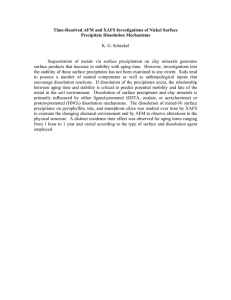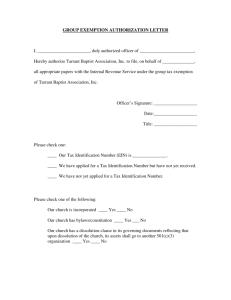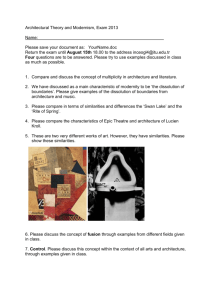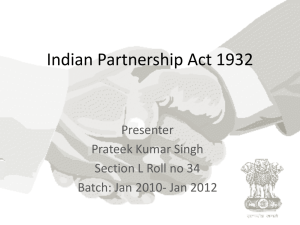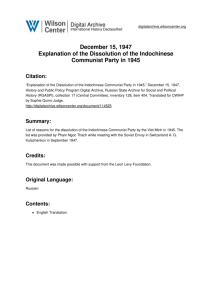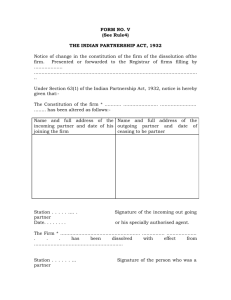Real Estate, Construction and Land Use Court Speaks Out
advertisement
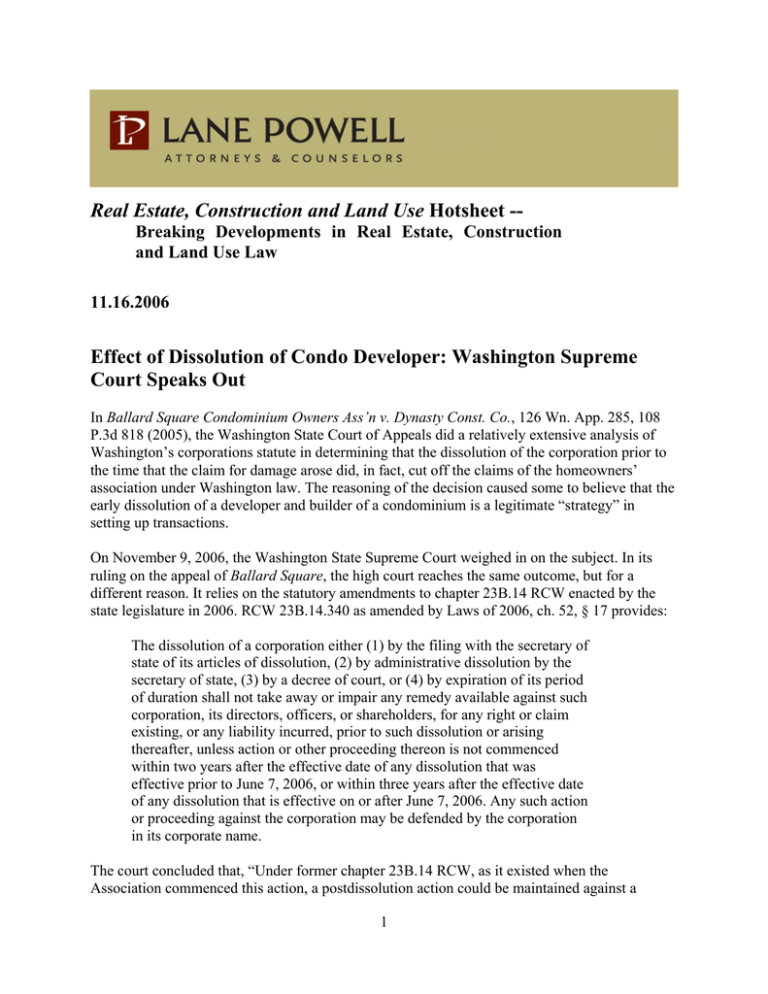
Real Estate, Construction and Land Use Hotsheet -Breaking Developments in Real Estate, Construction and Land Use Law 11.16.2006 Effect of Dissolution of Condo Developer: Washington Supreme Court Speaks Out In Ballard Square Condominium Owners Ass’n v. Dynasty Const. Co., 126 Wn. App. 285, 108 P.3d 818 (2005), the Washington State Court of Appeals did a relatively extensive analysis of Washington’s corporations statute in determining that the dissolution of the corporation prior to the time that the claim for damage arose did, in fact, cut off the claims of the homeowners’ association under Washington law. The reasoning of the decision caused some to believe that the early dissolution of a developer and builder of a condominium is a legitimate “strategy” in setting up transactions. On November 9, 2006, the Washington State Supreme Court weighed in on the subject. In its ruling on the appeal of Ballard Square, the high court reaches the same outcome, but for a different reason. It relies on the statutory amendments to chapter 23B.14 RCW enacted by the state legislature in 2006. RCW 23B.14.340 as amended by Laws of 2006, ch. 52, § 17 provides: The dissolution of a corporation either (1) by the filing with the secretary of state of its articles of dissolution, (2) by administrative dissolution by the secretary of state, (3) by a decree of court, or (4) by expiration of its period of duration shall not take away or impair any remedy available against such corporation, its directors, officers, or shareholders, for any right or claim existing, or any liability incurred, prior to such dissolution or arising thereafter, unless action or other proceeding thereon is not commenced within two years after the effective date of any dissolution that was effective prior to June 7, 2006, or within three years after the effective date of any dissolution that is effective on or after June 7, 2006. Any such action or proceeding against the corporation may be defended by the corporation in its corporate name. The court concluded that, “Under former chapter 23B.14 RCW, as it existed when the Association commenced this action, a postdissolution action could be maintained against a 1 dissolved corporation provided it was commenced within the statute of limitations applicable to the particular cause of action asserted. However, in 2006 the legislature amended RCW 23B.14.340 to provide that a postdissolution action against a dissolved corporation that dissolved prior to the effective date of the amendments must be commenced within two years of dissolution. These amendments apply retroactively and bar the Association’s suit.” Given the specific facts of Ballard Square, the court “does not reach” the developer’s defenses related to the four-year statute of limitations in RCW 64.34.452(1) (dealing with condo buyers’ claims based on warranties of quality). Whether a different set of facts will generate a further challenge based on the conflict between the language of the condo statute – which could be described as a consumer protection – and the corporate dissolution statute remains to be seen. Note that while this case applies only to corporations, the 2006 legislature also passed a companion statute dealing with limited liability companies: The dissolution of a limited liability company does not take away or impair any remedy available against that limited liability company, its managers, or its members for any right or claim existing, or any liability incurred at any time, whether prior to or after dissolution, unless an action or other proceeding thereon is not commenced within three years after the effective date of dissolution. [Emphasis added.] For more information, please contact the Real Estate, Construction and Land Use Practice Group at Lane Powell: 206.223.7000 Seattle 503.778.2134 Portland realestate@lanepowell.com www.lanepowell.com We provide Real Estate, Construction and Land Use Hotsheet as a service to our clients, colleagues and friends. It is intended to be a source of general information, not an opinion or legal advice on any specific situation, and does not create an attorney-client relationship with our readers. If you would like more information regarding whether we may assist you in any particular matter, please contact one of our lawyers, using care not to provide us any confidential information until we have notified you in writing that there are no conflicts of interest and that we have agreed to represent you on the specific matter that is the subject of your inquiry. © 2006 Lane Powell PC Seattle - Portland - Anchorage - Olympia – Tacoma - London 2

